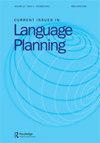规划多语教育的基本组成部分:柬埔寨多语教育国家行动计划案例研究
IF 1.8
1区 文学
Q2 EDUCATION & EDUCATIONAL RESEARCH
引用次数: 1
摘要
多语言教育(MLE)越来越被认为是确保非母语儿童公平接受教育和保留濒危语言的一种手段。教科文组织支持MLE,并确定了规划实施MLE的10个重要组成部分。本文根据作者在2019年进行的一项独立国内评估,研究了柬埔寨实施其第一个多语言国家行动计划(2014-2018)的这10个组成部分。研究结果表明,联合国教科文组织的10个基本组成部分是规划MLE的有用指南,但这一表述中缺少了三个更基本的组成部分。可见的、协作的国家领导层对于向利益相关者,特别是教师和家长保证MLE在公立学校获得授权至关重要。必须向负责确保优质教育的国家以下各级行为者提供充足的财政和技术资源。非主流语言使用者和倡导者是MLE的根源:如果没有语言和熟练的使用者,MLE几乎是不可能的。这三个要素——领导力、资源和非母语人士的投入——在语言规划和伙伴关系发展中经常缺失,它们是柬埔寨在五年任期内实施MLE的许多差距的原因。本文章由计算机程序翻译,如有差异,请以英文原文为准。
Essential components in planning multilingual education: a case study of Cambodia’s Multilingual Education National Action Plan
ABSTRACT Multilingual education (MLE) is increasingly recognized as a means to ensure equitable access to education for children with a nondominant first language and to retain endangered languages. UNESCO has championed MLE and identified 10 essential components in planning implementation of MLE implementation. This article examines these 10 components in Cambodia’s implementation of its first Multilingual National Action Plan (2014–2018), drawing on an independent in-country evaluation conducted by the authors in 2019. The findings suggest that UNESCO’s 10 essential components are a useful guide for planning MLE, but that three even more foundational components are missing from this formulation. Visible, collaborative national leadership is critical to assure stakeholders, especially teachers and parents, that MLE is authorized in government schools. Adequate financial and technical resources must be provided to subnational actors charged with ensuring quality education. The nondominant language speakers and advocates are at the root of MLE: without the language and proficient speakers, MLE is nearly impossible. These three elements – leadership, resources, and input from nondominant language speakers – are often missing in language planning and partnership development, and they account for many of the gaps in the implementation of MLE in Cambodia during its five-year term.
求助全文
通过发布文献求助,成功后即可免费获取论文全文。
去求助
来源期刊

Current Issues in Language Planning
Multiple-
CiteScore
4.80
自引率
16.70%
发文量
26
期刊介绍:
The journal Current Issues in Language Planning provides major summative and thematic review studies spanning and focusing the disparate language policy and language planning literature related to: 1) polities and language planning and 2) issues in language planning. The journal publishes four issues per year, two on each subject area. The polity issues describe language policy and planning in various countries/regions/areas around the world, while the issues numbers are thematically based. The Current Issues in Language Planning does not normally accept individual studies falling outside this polity and thematic approach. Polity studies and thematic issues" papers in this journal may be self-nominated or invited contributions from acknowledged experts in the field.
 求助内容:
求助内容: 应助结果提醒方式:
应助结果提醒方式:


